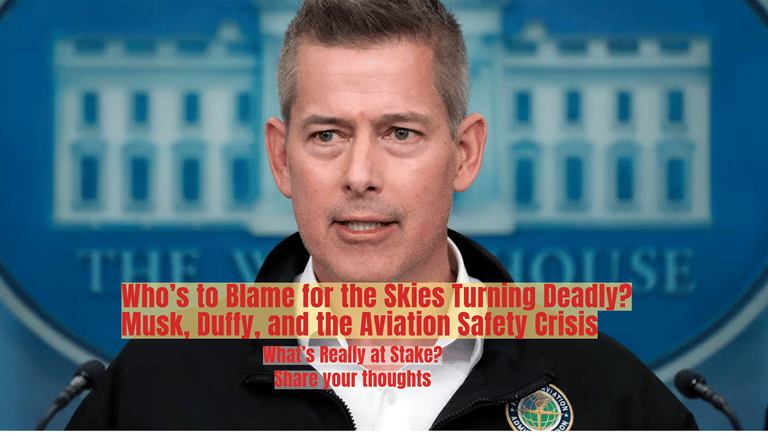Who’s to Blame for the Skies Turning Deadly? Musk, Duffy, and the Aviation Safety Crisis.
4/22/20253 min read


Who’s to Blame for the Skies Turning Deadly? Musk, Duffy, and the Aviation Safety Crisis.
Introduction: A Storm Brewing in the Skies
Imagine boarding a plane, the hum of engines in the background, and wondering: is this flight as safe as it should be? Recent aviation incidents—like the Bell 206 helicopter crash in the Hudson River and a Cessna 310 crash in Boca Raton on April 11, 2025—have sparked a firestorm of debate. At the center of it all is a viral X post by Richard Angwin, who points the finger at Transportation Secretary Sean Duffy, Elon Musk, and the Department of Government Efficiency (DOGE) for budget cuts allegedly leading to fatal crashes. But is this the full story, or are we missing a bigger picture? Let’s dive into the turbulence shaking up aviation safety.
The X Post That Sparked Outrage
On April 12, 2025, Richard Angwin (@RichardAngwin) replied to a Democratic Wins Media post on X, stating:
“Duffy, Musk, and DOGE are a disaster for aviation safety. Budget cuts led to fatal crashes, and now they’re pointing fingers. We need leadership that prioritizes lives over savings, not this reckless mess. FAA deserves better.”
His words struck a chord, amassing replies ranging from fiery agreement to outright dismissal. Some users blamed DEI (Diversity, Equity, and Inclusion) policies for lowering standards, while others defended Musk, citing his role in rescuing astronauts stranded by the Biden administration. The debate is as heated as a jet engine, but what’s really going on?
The Context: Budget Cuts and Crashes
Angwin’s frustration isn’t baseless. A December 2024 Skift report warned that Elon Musk’s involvement with DOGE—a non-official advisory group co-led with Vivek Ramaswamy—could lead to slashed FAA regulations and budgets. The Department of Transportation’s 2025 plan prioritized modernizing airspace systems and safety, but Musk’s promise to cut government spending has raised alarms. Could fewer regulations mean fewer air traffic controllers and weaker safety protocols?
Fast forward to April 2025, and the FAA reports a string of incidents: a helicopter crash in the Hudson River (six on board), a Cessna crash in Florida (three on board), and more. Meanwhile, Sean Duffy, the new Transportation Secretary, blamed an air traffic controller shortage on retirements during a Fox Business interview—conveniently sidestepping claims that he fired potential replacements, as reported by Crooks and Liars on April 17, 2025. Critics like Angwin argue these cuts and mismanagement directly endanger lives.
The Counterargument: Is DEI the Real Culprit?
Not everyone agrees with Angwin. Replies to his post reveal a deep divide. @DaisonEllen wrote, “DEI is the cause of this, not Musk. Fire Duffy’s ass.” Others, like @susanfritts21, mocked the idea of blaming Musk, pointing to past administration failures under figures like Pete Buttigieg. A thread on Aviation Stack Exchange even questions if DEI policies have lowered training standards, though no peer-reviewed data confirms this as of April 2025. Meanwhile, @Linda97262372 defended Musk, noting his SpaceX rescued astronauts stranded for nine months—a point that doesn’t directly address aviation safety but highlights his broader credibility.
What’s Really at Stake?
The FAA is under pressure, and the public is scared. Aviation remains the safest mode of travel, as Duffy claimed, but recent crashes—combined with a visible blame game—erode trust. If budget cuts reduce air traffic controllers or weaken oversight, the risks could climb. On the flip side, overregulation can stifle innovation, as some airline executives argue. Musk’s DOGE may aim to streamline government, but at what cost? And are DEI policies a convenient scapegoat, or a genuine concern?
The truth likely lies in a messy middle. No hard data directly links Musk’s cuts to these crashes, but the timing is suspicious. Duffy’s leadership is under scrutiny, and the FAA needs resources—now more than ever.
Conclusion: A Call for Accountability
The skies are a shared space, and their safety is non-negotiable. Whether it’s Musk’s budget-slashing agenda, Duffy’s questionable decisions, or broader systemic issues, we need transparency and action. Aviation safety isn’t a political football—it’s a matter of life and death. As we navigate this crisis, let’s demand leadership that puts passengers first.
Thought-Provoking Questions for Readers
- Do you think budget cuts under Musk and DOGE are directly responsible for recent aviation incidents, or are there deeper issues at play?
- Should Sean Duffy take more accountability for the air traffic controller shortage, or is he being unfairly blamed?
- How can the FAA balance innovation, regulation, and safety in a politically charged climate—any ideas?
Let me know your thoughts in the comments—I’d love to hear how you’d solve this high-flying dilemma!
Reference:
- Richard Angwin’s post criticizes Transportation Secretary Sean Duffy, Elon Musk, and DOGE (Department of Government Efficiency) for budget cuts linked to fatal aviation crashes, reflecting concerns from a Skift report (Dec 2024) about Musk’s potential to slash FAA regulations, which could compromise safety.
- The backdrop includes recent aviation incidents, like a fatal helicopter crash and a minor plane collision reported by Raw Story (April 2025), highlighting public and political tension over FAA funding and safety oversight.
- Angwin’s stance contrasts with replies blaming DEI policies or defending Musk, showing a polarized debate on aviation safety causes, with no peer-reviewed data directly tying Musk’s cuts to crashes as of April 2025.
hello@boncopia.com
+13286036419
© 2025. All rights reserved.